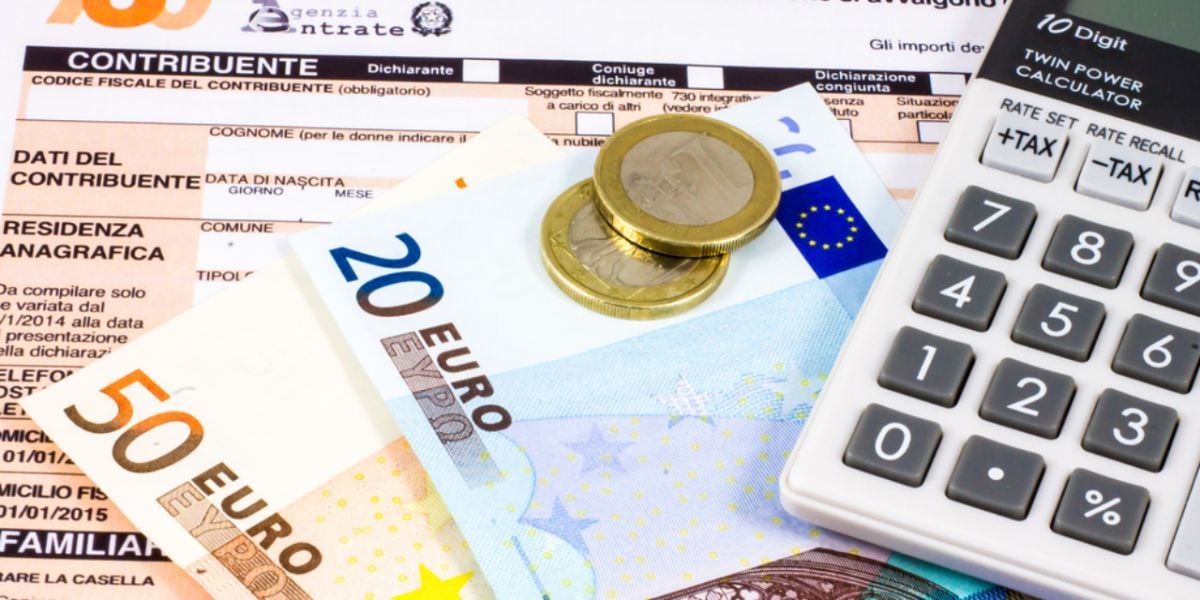
Once you have settled in Italy, you will be subject to personal income tax (Imposta sul reddito - IRPEF), in addition to corporate tax (if you have set up your own business), VAT, and property taxes if you are a homeowner. In this article, we will give you a general framework of the Italian tax system. However, it's recommended that you contact a professional tax advisor who will be able to guide you and answer any questions you may have on the subject.

All persons considered Italian tax residents are required by law to declare their income in Italy, regardless of its source. Tax residents in Italy are individuals who, for at least 183 days per year during the tax period, are registered in the population registers (anagrafe), or have established their domicile or residence in Italy within the meaning of the Italian civil code.
The tax year runs from 1 January to 31 December and corresponds to the solar year. The operation and calculation of the tax are similar to that of many European countries in terms of tax rates, income brackets, etc.
Tax scale in Italy
As in many EU countries, income tax in Italy is deducted at source, according to the progressive scale used during the tax year. It varies according to the nature and area of your employment, your employment contract, and other factors such as your marital status.
In general, to calculate income tax and to define the taxable base, the Italian tax system takes into account the following different types of income:
- Income related to wages (redditi di lavoro dipendente) or retirement pensions (pensioni)
- Income from land (redditi fondiari)
- Income from capital (redditi da capitale)
- Self-employment income (redditi di lavoro autonomo)
- Commercial income (redditi di impresa)
- Income from capital gains (redditi diversi), which are not obtained in the exercise of a professional activity, for example, income from real estate capital gains in the case of a sale
The tax rate depends on the income bracket to which you belong:
- Tax bracket 1 (up to €15,000) - 23%
- Tax bracket 2 (€15,000 - 28,000) - 25%
- Tax bracket 3 (€28,000 - €50,000) - 35 %
- Tax bracket 4 (over €50,000) - 43 %
The income tax scale in Italy has been revised as part of the 2022 budget law, going from five to four brackets and reducing the tax rate for middle-income categories.
Other than that, you will have to pay an additional municipal tax linked to the IRPEF, the amount of which is left to the discretion of the municipality concerned. Some municipalities may set an exemption threshold.
There is also a regional tax of up to 3.33%, depending on your income bracket, set by each region. So it will be different, for example, in Florence, Milan or Rome, but also in the smallest cities in the surrounding area.
Good to know:
Unlike some EU countries, Italian tax law requires that each member of the same family be taxed individually on each income they receive. Therefore, married couples have to fill in a tax return form for each partner, with the income from the property being divided into two equal parts under the community of property regime in the absence of any other tax treaty required by the spouses.
Tax deductions and credits in Italy
Paying taxes in Italy also makes you eligible for tax deductions for expenses incurred personally or for the rest of the family. In addition, the Italian tax system allows taxpayers to benefit from a tax credit (detrazione) if they have incurred expenses during the tax year for which they are filing their tax returns, for example, medical expenses (which can be deducted up to an amount of 19%) or the interest on your home loan.
There is another form of tax deduction, called deduzione in Italian, which applies to expenses that help reduce the overall income on which the tax due is calculated. This is the case for compulsory and voluntary social security contributions.
The following is a non-exhaustive list of expenses that may allow you to benefit from a tax credit (detrazione):
Health:
- if you have medical and veterinary expenses, in particular, related to the services of a general practitioner and/or specialist or to hospitalization in the case of surgery;
- if you support a disabled person even if they are not dependent on you.
Property:
- if you are renting and have a limited income;
- if you have bought a property in Italy and own it;
- if you have taken out a home loan in your own name, you can deduct the interest;
- if you have used the services of a real estate agency;
- if you have renovated your main residence and used a construction company for the work, Italian law provides for a refund of up to 50% of the expenses incurred;
- if the work carried out in your home and residence consists of improving energy performance.
Family:
- if a taxpayer has a dependent spouse and/or child(ren);
- if you are in possession of a season ticket for public transport;
- if you have health or accident insurance in Italy;
- if your children are at university and you are paying university fees and accommodation;
- if you have donated to political parties, research institutions or a religious organization, or to any other non-profit organization;
- if you have paid for a funeral.
Among the expenses that make you eligible for a tax deduction are:
- compulsory and voluntary social security contributions ;
- premiums related to the supplementary pension;
- periodic spousal maintenance in the event of divorce or separation;
- contributions to religious institutions, etc.
Good to know:
For a complete list of the different types of tax credits and deductions, also called agevolazioni in Italian, from which you can benefit as a resident., visit the Italian Revenue Agency, in Italian Agenzia delle Entrate. There, information is updated regularly. You will also find useful guides for residents and taxpayers on topics related to taxes in Italy but also on double taxation for European/international workers.
It is important to keep a track-record of all your expenses. Indeed, under the Italian tax system, you can benefit from tax credits and deductions if your payment is traceable and you keep proof of it. Therefore, as far as possible, make bank transfers and keep your bank statements, receipts, or receipts if you decide to pay by credit card.
Property taxes in Italy
Property taxes paid by property purchasers vary according to the type of property purchased, the assets and the seller.
If you are buying as a private individual and the seller is a private individual or a company not liable for VAT, the taxes rates are as follows:
- a registration tax of 9% of the sale price (or cadastral value). If you are a first-time buyer in Italy (prima casa), you are entitled to a 2% tax break. However, if the property purchased is in a luxury category (A/1, A/8, A/9: historic houses and villas, palaces and castles), you will not benefit from this;
- a mortgage and cadastral tax of €50 each;
- the IMU, Imposta Municipale Propria, if the property purchased is considered a secondary residence (the IMU does not apply to the purchase of the first house or main residence). The calculation depends on the cadastral income of your property increased by 5% and multiplied by the cadastral coefficient (which depends on the category of the property A/1, A/2, A/3, etc.). The total is then multiplied by the IMU rate in force in the reference year;
- TARI, the waste tax.
If the seller is a company and the sale is subject to VAT, the rates will be as follows:
- a VAT of 10% on the sale price or 4% if it is your first home;
- a registration tax of €200;
- a mortgage tax of €200;
- a cadastral tax of €200.
Good to know:
To these taxes, at the time of purchase, you will probably have to add other costs: notary, lawyer, translator, real estate agency commission, etc.
Self-employed tax in Italy
If you are self-employed in Italy and subject to the ordinary tax system, the personal income tax (IRPEF) is calculated in the same way as for employees. Also, the same tax brackets apply, but you will have to file your tax return electronically or through a professional, such as an accountant. You can find the tax return forms on the website of the Agenzia delle Entrate.
However, if you are self-employed and are part of the flat-rate tax system, a different tax rate applies to your profile. In fact, according to Italian law, you will have to pay the equivalent of a 15% tax deducted at source from your income. In addition, from the first to the fifth year of activity, this amount does not exceed 5% in order to allow young entrepreneurs to get started.
To benefit from this flat-rate regime and its advantages, you must respect certain precise criteria that are carefully monitored by the Italian tax authorities. For example, your income cannot exceed €65,000 per year, and you cannot earn more than €30,000 as an employee.
The Italian flat-rate system has given rise to the concept of a "profitability coefficient", a percentage defined according to the professional category to which you belong and your activity, which is itself designated by an Ateco code. This coefficient determines the income on which your taxes will be calculated and identifies the presumed expenses of each type of activity that should not be included in the calculation. This means that even if you have no expenses related to your activity, a fixed percentage will be subtracted from your income when your taxes are calculated.
A self-employed expat in Italy has to comply with certain legal requirements in order to be able to work as an individual. Here are the main steps you will have to take if you want to become self-employed:
- Obtaining a VAT number: it is necessary to fill in a form (AA9/12 for freelancers and AA7/10 for companies), a Dichiarazione di inizio attività, and to send it or deliver it in person to the Italian tax agency;
- The choice of the Ateco code(s) according to the sector in which you work: a VAT number cannot be obtained without at least one Ateco code, as this number is also used to determine taxation;
- The choice of tax and accounting regime (ordinary, flat-rate, or simplified);
- Registration with the company register if you are setting up a company;
- Registration with the INPS, the Italian social security institute;
- Possible registration with a professional association.
The first three steps are done at the Agenzia delle Entrate, the Italian tax agency, and can be done independently. However, as the Italian system is a complex one, you are advised to be assisted by a tax accountant who can take care of everything for you from the beginning of your journey and afterwards. It is very common for Italians, both self-employed and employed, to seek professional help, especially for their tax returns.
As a self-employed expat in Italy, expect to pay between €600 and €2,500 per year for the services provided by a tax accountant: tax returns, payment reminders, tax payments, invoicing assistance, updates on current regulations, etc. The cost varies according to your status, the city of reference and your sector of activity. Do not hesitate to ask for a quote from several professionals before choosing.
Important:
Tax returns (Dichiarazione dei Redditi) must be filed online by 30 September, or in paper form between 2 May and 30 June. Due to the complexity of the tax system, it is common in Italy to hire an accountant/tax specialist, “commercialista” in Italian, or a "CAF" office to do the tax return for you. The services provided are, of course, paid, but you can be sure that the declaration is made properly by competent people.
It is also possible to pay your taxes in Italy using a pre-filled online tax return template, modello 730 Redditi persone fisiche precompilato. Your income, as well as all your expenses, such as medical expenses, social security contributions and insurance premiums, will already have been inserted in the document. If you validate this pre-filled declaration by the Ministry of Finance, you will no longer be subject to a tax audit or have to provide proof of your income and expenses.
Double taxation in Italy
Beware of double taxation during your stay in Italy! If you receive income from foreign and Italian sources simultaneously, you will be subject to double taxation. This means that you will have to pay taxes in Italy and in your home country on all forms of income received. This may include income tax, wealth tax, inheritance tax, gift tax, pension tax, etc. This is often the case for non-resident taxpayers who receive income from Italian sources or for tax residents in Italy whose main and/or secondary income is from a foreign country. In this case, each of the countries concerned will put in place provisions to ensure their power to tax the taxpayer's income.
At the international level, no law prohibits double taxation. Therefore, to limit and prevent this phenomenon, many European and non-EU states have signed double taxation agreements. This task is now the responsibility of the OECD, the Organisation for Economic Cooperation and Development.
You are, therefore, advised to check whether your country of origin has signed a bilateral double taxation treaty with Italy.
Other taxes in Italy
As a resident in Italy, you will be required to pay other taxes, such as the waste tax (TARI), which is the responsibility of the municipal authorities. This tax is intended to finance waste collection and treatment services. It is calculated according to the size of your home (m²) and the number of people in the household.
Other Italian taxes you have to pay include the IMU, Imposta municipale propria. This tax is intended for taxpayers who also own, in addition to their home and main residence, a second home, land, or other property.
Important:
Taxpayers who are Italian tax residents, regardless of their nationality, are required to pay the IVIE, Imposta sul valore degli immobili situati all'estero, a wealth tax, if they own real estate outside the Italian border.
The owners of real estate covered are individuals, partnerships, trusts and foundations, and any other non-commercial entity. You can find more information on the website of the Agenzia delle entrate.
Useful links:
Dichiarazione dei redditi - Agenzia delle Entrate
Ministero dell'Economia e delle Finanze
We do our best to provide accurate and up to date information. However, if you have noticed any inaccuracies in this article, please let us know in the comments section below.








